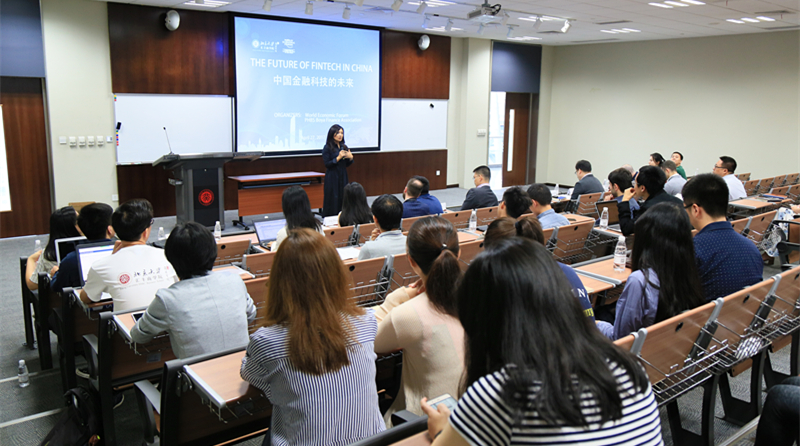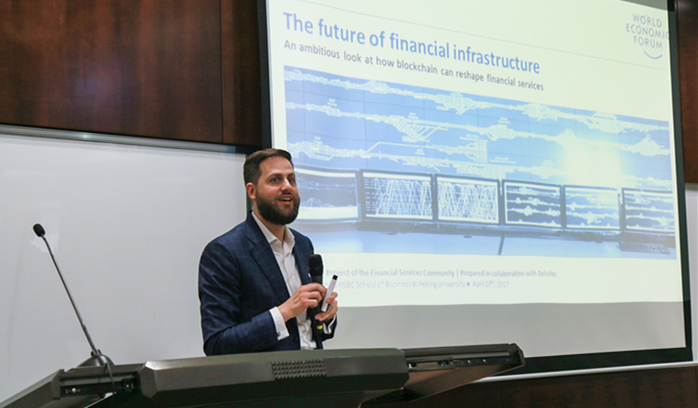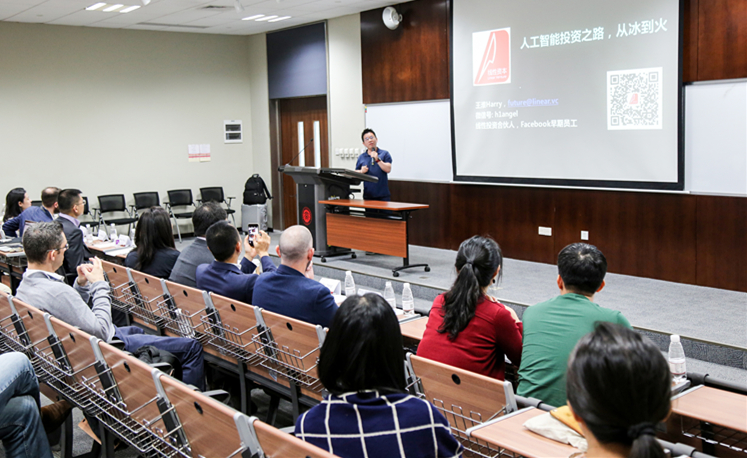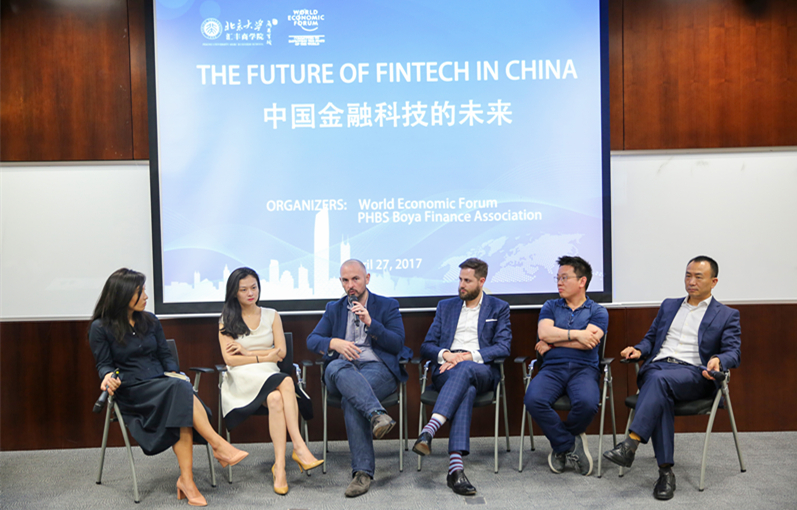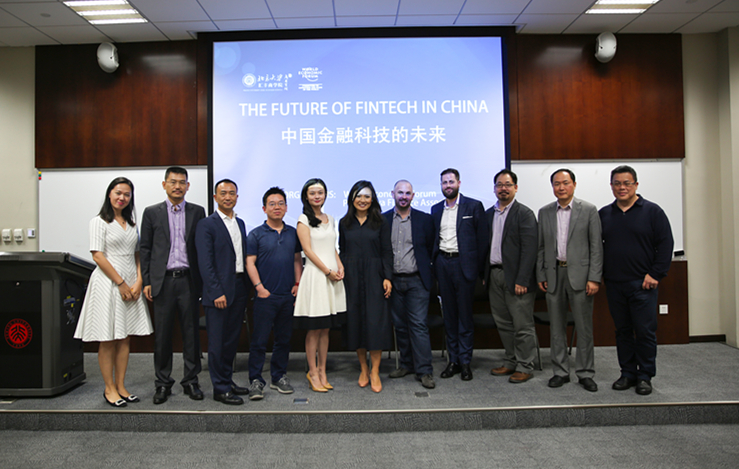Technology can be defined as “the branch of knowledge that deals with the creation and use of technical means and their interrelation with life, society and environment, drawing upon subjects as industrial arts, engineering, applied science and pure science”.
As technology has reached a stage of exponential growth in the past decade, things humans never thought were possible are becoming part of our daily lives. Fintech and blockchains are fast becoming the new buzz words, and are not only taking over, but look set to be here to reshape the financial industry. But what exactly are these buzz words about?
Jennifer Zhu Scott , founding partner at Radian Partners, gives brief opening remarks.
On 27 April, the World Economic Forum (WEF) in partnership with the PHBS BOYA Finance Association hosted a forum on “The Future of Fintech in China” at Peking University HSBC Business School (PHBS) to answer this question.
PHBS Associate Dean Ren Ting, Assistant Dean Young Joon Park, other faculty and students attended the event. Speakers in the field of fintech and with a wealth of knowledge and experience formed a panel, where fintech was not only unpacked but simplified to the audience.
Jesse McWaters speaks on the potential of blockchains.
Jesse McWaters, project lead at WEF for disruptive innovation in financial services, gave a fresh way to understand blockchains. By definition, a blockchain is a distributed database that maintains a continuously growing list of records, called blocks, secured from tampering and revision. He elaborated that instead of trying to understand complicated relationships involved with blockchain, it is better to rather ask “how does it work?”, just as most people do not know how smartphones are put together but rather worry about the “what?”, namely the capabilities and new functionalities new smartphones present to the consumers.
McWaters explained the three main capabilities of blockchains as a record keeping system which transfers value from one user to another with the ability to create smart contracts. You may now be wondering what the fuss is, since there are other tools capable of performing these capabilities. Blockchains go beyond just this as it is able to incorporate highly intermediated hub-and-spoke structure of many financial networks, which then create opportunities for blockchains to improve efficiency.
As the exceptionality of blockchains was revealed, the question still remained where fintech fits into this? Financial institutions have recently been known for big data and the need for high levels of efficiency, more so to drive down costs. Blockchain is able to offer just what these large financial institutions need through operational simplification, fraud minimization, liquidity and capital efficiency, counter-party risk reduction and so much more. For the first time in decades, a tool such as blockchain will call into question the fundamental orthodoxies of today’s business models, and this is just the beginning.
Wang Huai shares his thoughts on AI-driven business and investment
" Over the past few years, AI (
artificial intelligence) has risen from the ice-cold issue to the heated topic," commented Wang Huai, founding and managing partner of Linear Venture L.P. Once as Facebook's first Asian engineering manager, he has rich experience in high-tech industry and now has led investments in more than 40 technology companies, including sector leading startups such as Horizon Robotics, Rokid, and FraudMetrix,etc. He first shared Linear's investment landscape in AI industry, and then analyzed the financing trend and development prospect of AI. " There exist bubbles in AI-driven industry, but good companies will eventually rise from the ashes of the bubbles." Wang thought AI-driven companies should not only perfect technologies, but also enhance market penetration, so as to achieve large-scale AI+ business .
Panellists (from left): Jennifer Zhu Scott (moderator), Jing Zhou, Liam Gilligan, Jesse McWaters, Huai (Harry) Wang, Ruirong (Ray) Yang
The panel that followed featured five guest speakers from different fields of expertise. With nearly 20-year multinational banking experience, Zhou Jing, CEO of Dumiao, PINTEC, provided her insights on credit industry from the perspective of effective lending driven by fintech, probing into the often-raised question of how big data and algorithms can help to facilitate lending process.
Liam Gilian, head of Innovation Lab HK, Commonwealth Bank of Australia (CBA), using CBA as an live example, talked about fintech's impact on a traditional bank in the transition of both its business and culture. As an professional investor, Yang Ruirong, partner and managing director at Marathon Venture Partners, revealed that it is better to take fintech leverage to improve investment strategies, and shed some lights on how to spot the marketable and promising companies driven by fintech.
In the Q&A , the panel managed to answer some questions with finesse. Not only did they wow the audience, but gave them some advice on how to embrace the world of fintech, such as : one needs to ensure they work on their intellectual flexibility ; and at the end of the day, every job is a sales job, and the ability to sell either your skills or a product is crucial.
The group photo of panelists and organizers
There is still more to be learnt and understood about the fintech space, with new players entering the market and others existing. Will the future of financial institutions be one never fathomed before? Will technology render some financial institution redundant? All these uncertainties are just the tip of the iceberg, as the world waits with bated breath to find out the answers.
By Realeboga Maboe
Edited by Annie Jin
photographer: Xie Feng





